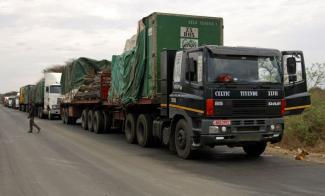International cooperation
Continent of opportunity

The African Development Bank (AfDB) enjoys a long standing relationship with Germany, which is the third largest contributor to its concessional window. In addition, Germany contributes to several trust funds in the AfDB such as the Infrastructure Project Preparation Facility of NEPAD (New Partnership for African Development), the Climate Change Trust Fund, the Infrastructure Consortium for Africa (ICA) and, more recently, the Africa Renewable Energy Initiative (AREI).
Africa remains the second fastest growing region in the world and accounts for over six of the ten fastest growing economies. In addition, Africa is the second largest destination for foreign-direct-investment inflows in the world, behind the Asia Pacific region. Africa has been attributed a third of the total number of investment climate reforms that have been implemented in the past decade.
In spite of these positive developments, Africa still faces challenges. Over 650 million Africans lack access to electricity, which stifles economic activity and growth. Agricultural productivity is low and Africa spends over $ 35 billion per year to import food, in spite of the fact that Africa has over 65 % of the world’s arable land. Africa accounts for only about two percent of global merchandise exports and this has been the case for decades. In addition, the manufacturing sector in Africa accounts for just about 11 % of GDP. Intra-African trade is just about 15 %, as opposed to 69 % for Europe and 53 % for Asia. This increases the cost of transportation, cost of doing business and hampers competitiveness. Youth unemployment is a serious issue.
It is in a bid to address the challenges that the Bank has defined five goals it calls the “High 5 s”. They are:
- light up and power Africa,
- feed Africa,
- industrialise Africa,
- integrate Africa and
- improve the quality of life for the people of Africa.
Significant financial resources are required to achieve the High 5s, over and above those of the AfDB. We therefore intend to leverage external resources and count on Germany’s continuous support for the achievement of these ambitious goals.
The Bank is pleased to note the close alignment of the Marshall Plan’s foundations with the High 5s. This gives us a very strong basis for building a strategic partnership between the Bank and Germany with a view to delivering development programmes.
The Marshall Plan proposes a new level of equal cooperation between Germany and Africa. In view of the close alignment between the Bank’s High 5s, Agenda 2063 of the African Union, the UN Sustainable Development Goals (SDGs) and the Marshall Plan, the AfDB is Germany’s natural strategic partner in developing these programmes. A recent UNDP report indicated that implementing the High 5s will enable the achievement of 90 % of the SDGs and Agenda 2063.
In spite of the challenges, Africa is indeed the continent of opportunity – with 65 % of the world’s uncultivated arable land, over 20% of the world’s youngest population, with the highest pace of urbanisation, a rising middle class and increasing investment attractiveness. Germany’s Marshall Plan will provide an opportunity to leverage these opportunities and foster wealth and job creation in Africa.
Frannie Leautier is senior vice president of the African Development Bank.
http://www.afdb.org







